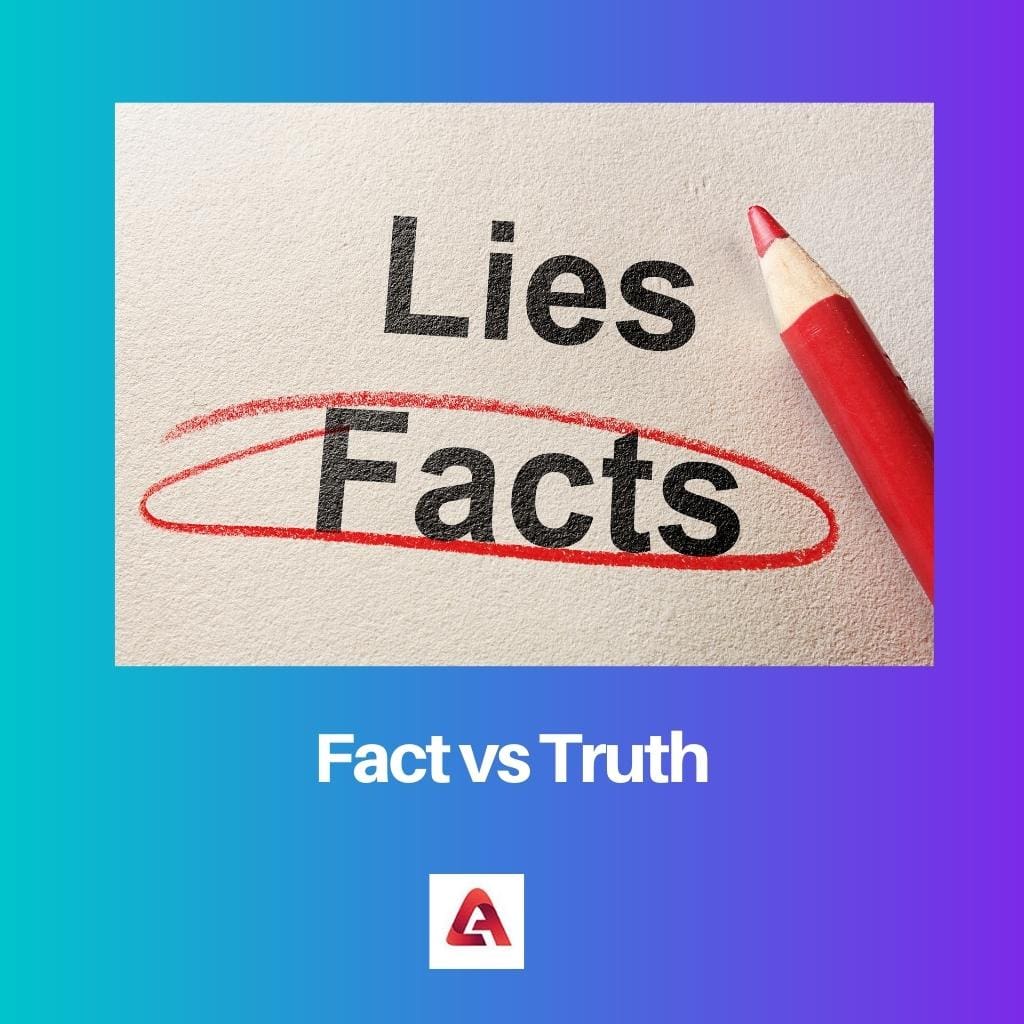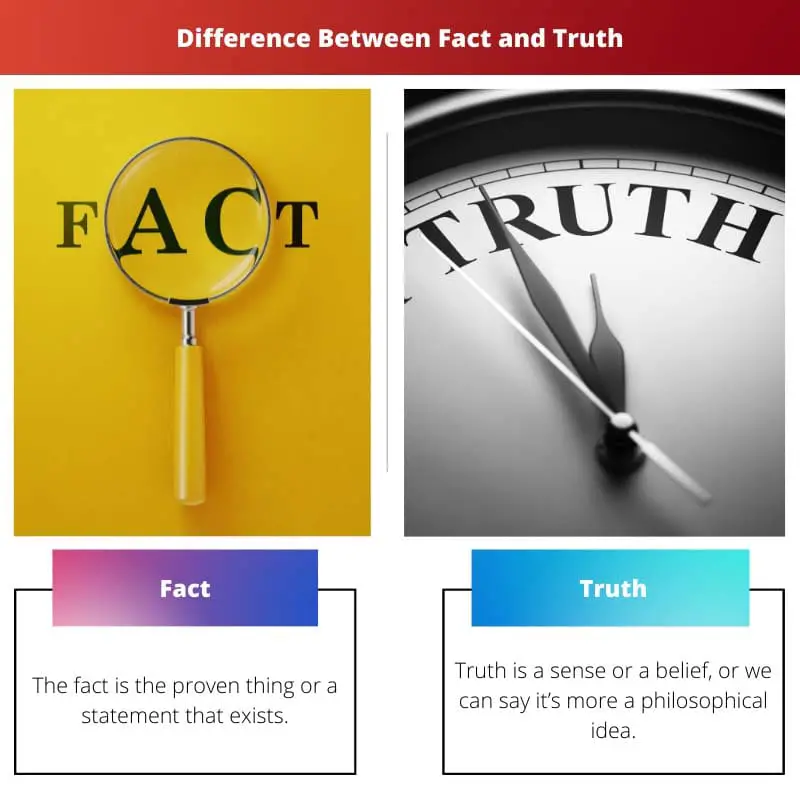The Sun always sets in the west. The wind blows in the atmosphere. We all are surrounded by lots of things that exist. Some we can touch, and some we can feel.
But there are these two terms- fact and the truth. Both sound quite similar, yet they are completely different from each other.
Key Takeaways
- A fact is a statement that can be proven or verified, while the truth is a broader concept that can include subjective beliefs and experiences.
- Facts are objective and based on evidence, while truth can be subjective and based on personal perspective.
- Facts are concrete and verifiable, while truth can be abstract and open to interpretation.
Fact vs Truth
A fact is a statement that can be proven true or false based on empirical evidence or objective reality. Truth is a broader, more philosophical concept, referring to the state or quality of being in accord with fact or reality, and it can be subjective or intersubjective based on perception or belief systems.

If we talk about the word fact and its meaning, it can be understood by a sentence like “The fire is hot”. It’s based on the factual and experimented thing.
Like if you try to touch fire, you can get wounds, and it will, of course, feel hot. It’s not just that you see, and it’s over. It’s more than can be observed empirically or by sensing.
Conversely, the truth can be said to be a real state of a matter, like nouns, in what a person comes to believe sometime later. Truth is not universal in Nature. It’s more of a subjective situation that depends on current issues and challenges. It’s not a factual thing or an experimental item.
Comparison Table
| Parameters of Comparison | Fact | Truth |
|---|---|---|
| Definition | The fact is the proven thing or a statement that exists. | Truth is a sense or a belief, or we can say it’s more a philosophical idea. |
| Basis | A fact is a confirmed observation situation. | Truth is a norm or a kind of acceptance that has nothing to do with fact. |
| Law basis | It’s more a science law since it undergoes certain degrees of observation and experiments. | Truth is not a scientific law. Instead, it’s more a religious, artistic, or philosophical belief people observe. |
| Confirmation | A fact is a proven identity. | It’s based on values or beliefs. |
| Stage | It has several process or stages that make sure it’s a factual thing. | Since it’s a belief, it could be a baseless or a proven thing, but it’s more an idea. |
What is Fact?
See, there are certain norms or things we come across every day, whether it’s a belief in the almighty, things that exist in real life, or have a physical state that is examined or investigated.
Certain beliefs we have inside our minds predominantly come from older people. While it may or may not be true, we still encounter superstitions many times.
The word fact is a proven thing. It’s more like a verified thing. Sunlight gives us vitamin D. In this case, and it’s scientifically proven that it does help in rejuvenating our body.
Hence it’s a source of vitamins, and based on facts, science works. It can be defined as the things that can be demonstrated based on experiments.
Another example can be like “Uranus is the 7th planet of our solar system. Yes, it’s an astronomical fact that is proven by many astronomers. Or like “Narendra Modi won the 2014 elections and became the Prime Minister of India”. Again, it’s a piece of factual news based on facts and proof.
It is derived from the Latin word factum. The occurrence and the shreds of evidence make the fact a meaningful word. Certain other examples make the word fact as a powerful word in the dictionary.

What is Truth?
It’s more an agreement with fact or reality. Well, truth is way different from the meaning of the word fact.
The word “truth” indicates the real part or corresponding to it, like beliefs, declarations, and propositions. We believe that God exists, Superpower exists, but if we consider facts and evidence, we don’t have much to declare that God or the almighty exists.
When these beliefs join the world, it creates a peaceful place. The truth that everything is going to be okay isn’t a proven thing. Yes, it’s a hopeful statement that someday things will be okay, but in reality, it could happen, or things can go worse.
It’s a philosophical idea, artistic view, or a religious thought about something that we consider the Truth. It’s not something like a science law that is derived by the people or the scientists like we found Uranus is a planet in the solar system.
There are chances that it can have a base, or it could be a baseless thing.
It’s the opposite of the word false, which means that it is not true or something that isn’t what it is. Some fields deal with the word truth. Unlike the science field, there are sectors on which debates, and discussions happen on what grounds or on which criteria the word truth shall be defined.

Main Differences Between Fact and Truth
- A fact is a statement that exists in the real world, while truth can be an assumption.
- A fact is a scientific law that deals with realistic items, while the truth is more a philosophical, religious, or artistic thought that deals with beliefs.
- A fact is an observed situation, while a truth could happen from superstitions.
- A fact is more likely to affect the world by revealing evidence and proof, while a truth could be a baseless thing or maybe an idea going on for ages.
- “The Sun does set in the west, Earth is one of the planets of the solar system”, while “we believe in God and superpowers” is true.

- https://www.degruyter.com/document/doi/10.4159/harvard.9780674429062/html
- https://link.springer.com/chapter/10.1007/978-94-009-2727-8_5

The discussion about truth as a philosophical idea is thought-provoking and adds depth to the article’s content.
I share the same sentiment, Karen. The philosophical perspective on truth brings a new dimension to the topic.
The article does a great job of distinguishing between fact and truth, especially in the context of scientific and philosophical perspectives.
I completely agree, Dylan. The article’s coverage of both scientific and philosophical aspects was very informative.
The distinction between fact and truth is crucial, and this article presents it in a comprehensive manner. The inclusion of real-life examples enhanced the understanding of the concepts.
Absolutely, Chughes. Real-life examples always make theoretical discussions more relatable and engaging.
An interesting analysis of the concepts of fact and truth. The distinction is crucial in various fields, and this article provides valuable insights.
The comparison table provided really helps to understand the distinctions between fact and truth. I appreciate the clarity in this article.
Absolutely, Isaac. The comparison table is very informative and adds a lot of value to the content.
Agreed, Isaac. This article does a great job of breaking down the differences and making it easier to comprehend.
The thorough exploration of fact and truth in this article is commendable. The real-world applications of these concepts were particularly interesting to consider.
Absolutely, Roberts. The real-world applications truly enhanced the understanding of how these concepts operate in our lives.
I share the same view, Roberts. The practical examples added depth and relevance to the discussion.
I found the explanation of ‘truth’ as a philosophical idea very intriguing. It’s a deeper perspective that sheds light on the subjective nature of truth.
I completely agree, Stefan. The philosophical aspect of truth is overlooked, but it’s crucial to understanding its nature.
Interesting article that highlights the difference between fact and truth. It’s important to understand that facts can be proven or verified, while truth is more subjective and can be based on personal beliefs.
You’re absolutely right, Sabrina. It’s essential to differentiate between the two, especially in today’s world where truth is sometimes blurred by subjective beliefs.
The examples provided for both facts and truth were very clear and helped to illustrate the concepts effectively.
I couldn’t agree more, Carlie. The examples made it easier to grasp the differences and nuances between facts and truth.
I found the examples to be quite enlightening as well, Carlie. They added a practical dimension to the theoretical discussion.
The article effectively highlights the difference between fact and truth, and the explanation of truth as a philosophical idea was enlightening.
I agree, Evie. The philosophical aspect of truth provides a deeper understanding of the concept.
Absolutely, Evie. It’s essential to delve into the philosophical nature of truth to grasp its complexities.